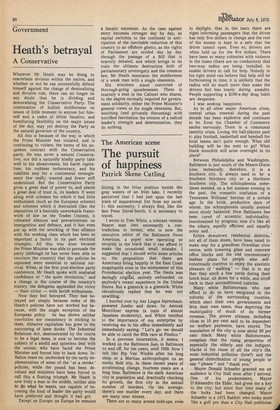Government
Heath's betrayal
A Conservative
Whatever Mr Heath may be doing to exacerbate division within the nation, and whether or not he can successfully defend himself against the charge of demoralising and divisive rule, there can no longer be any doubt that he is dividing and demoralising the Conservative Party. The combination of bullish stubborness on issues of little moment to anyone but himself and a cadre of elitist fanatics, and humiliating flexibility on the major issues of the day, may yet destroy the Party as the natural governor of the country, All this is because of the way in which the Prime Minister has violated, and is continuing to violate, the terms of his unspoken contract with the Conservative party. He was never a natural Conservative; nor did a naturally kindly party take well to his abrasiveness, his harsh capitalism, his ruthless technocracy, and his indelible zeal for a continental entanglement few really wanted and fewer still understood. But the Conservative Party gives a great deal of power to, and places a great deal of trust in, its leaders. It went along with schemes for which it had little enthusiasm (such as the European scheme) and schemes which it distrusted (like the imposition of a basically unworkable framework of law on the Trades Unions), it tolerated silences and prevarications on immigration and defence, and it has even put up with the wrecking of that alliance with the working class which has been so important a factor in its past electoral triumphs. All this was done because the Prime Minister was able to persuade the party (although he has never been able to convince the country) that the policies he espoused were essential to national survival. When, at the first post-election party conference, Mr Heath spoke with unabated confidence of "the quiet revolution," and a change in the course of the country's history, the delegates applauded the victor — their victor — with lavish enthusiasm.
Now they feel betrayed. They feel betrayed not simply because some of Mr Heath's policies have not worked but because, with the single exception of the European policy he has shown neither conviction nor consistency in sticking to them. Abrasive capitalism has gone in the succouring of lame ducks. The Industrial Relations Act, demonstrated by the courts to be a legal mess, is now to become the subject of a sordid and spineless deal with the unions, who have faced the Prime Minister and forced him to back down. In flation roars on, unchecked by the tardy im plementation of some of the 'at a stroke' policies, while the pound has been de valued and ministers have been forced to call this a floating triumph. Mr Heath is now truly a man in the middle, neither able to do what he wants, nor capable of becoming the kind of leader the party would have preferred and thought it had got. Except on Europe: on Europe he remains a fanatic extremist, As the case against entry becomes stronger day by day, as capital switches to the continent in anticipation of the inevitable reduction of this country to an offshore ghetto, as the rights of Parliament are eroded day by day through the passage of a Bill that is scarcely debated, and which brings in its train the ultimate destruction both of parliamentary sovereignty and the common law, Mr Heath maintains the stubborness of a weak man with a single obsession.
His ministers stand convicted of thorough-going spinelessness. There is scarcely a man in the Cabinet who shares, to the degree normally required for government solidarity, either the Prime Minister's general views or his single obsession. But, watching (and privately discussing) with horrified fascination the erosion of a radical leader's strength and determination, they do nothing.










































 Previous page
Previous page